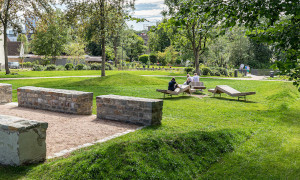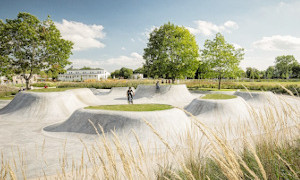bdla advisory board met in Halle (Saale).
On 5 April 2019, the advisory board meeting and annual conference of the bdla took place in Halle (Saale). bdla President Till Rehwaldt and Mario Kahl, Deputy Federal Executive Director, provided information about the association's activities in 2018 and 2019. The centrepiece was the communication of central association topics in the political arena: the White Paper on Urban Greening, the Masterplan Urban Nature and the reform of urban development funding. Till Rehwaldt considered the informal merger with BGL, BdB and ZVG as "Green Associations" a success, because "it is important to form alliances for successful lobbying".
Mario Kahl began the report of the federal management with the positive development of membership. Thus, the total number of members increased slightly over the year from 1 307 to 1 317. Looking only at the numbers of freelance and salaried members, an increase of 9% in freelancers and 26% in salaried/official members has been recorded since 2010.
Motivation to become a member of the bdla are not least the high-quality events of the association, such as construction manager talks, planting planner days, business forum, course environmental construction supervision and the designer days newly launched in September 2018. The strategy of identifying forward-looking areas of work and developing tailored training courses for members is to be continued. The decision to set up a working group on plant use also fits into this strategy.
One of the important projects of the last two years was the relaunch of the bdla website. The integrated new website has succeeded in creating a central online portal for German landscape architecture.
Elections and bdla honorary membership
After bdla president Till Rehwaldt had thanked the outgoing treasurer Harald Fugmann in the name of the executive committee and advisory board for his excellent work in the past six years, the election of the new treasurer was on the agenda. Jens Henningsen, freelance landscape architect and industrial engineer from Berlin, was nominated for the office by the board. Jens Henningsen is since 2008 speaker economics. As such, he had launched the bdla Economic Forum, which took place in February 2019 for the 11th time under his leadership. Previously, he was chairman of the bdla Berlin-Brandenburg for several years. Jens Henningsen was unanimously elected treasurer.
Thanks were also expressed to the outgoing spokesperson for training, Dr. Ute Fischer-Gäde, who had held the office since 2013. Marion Linke, freelance landscape architect and urban planner in Landshut, was elected as her successor. She has been a member of the bdla working group on training since 1998 and has recently been intensively involved in the development of a guideline on training-related registration requirements for landscape architects of the BAK. She also participates in the Landscape Architecture Expert Committee of the Accreditation Association for Degree Programmes in Architecture and Planning (ASAP). Until January 2019, she was chair of the bdla Bayern.
Re-elected were Prof. Fritz Auweck as spokesperson for international cooperation, Kerstin Berg as spokesperson for landscape planning, Prof. Dr. Swantje Duthweiler as spokesperson for plant use, Markus Illgas as spokesperson for construction technology and standards, and Prof. Stefan Pulkenat as spokesperson for garden monument preservation.
The proposal of the presidium to award the bdla honorary membership to Dr. Lutz Spandau, board member of the Allianz Umweltstiftung, was unanimously accepted. The award ceremony will take place on 3 April 2020 at Schloss Dyck.
Annual conference on restructuring of funding programs
The topic of the annual conference was "Current priorities in the Federal Ministry of Food and Agriculture in the development of rural areas and the design of funding programs". bdla President Till Rehwaldt welcomed Dr. Klaus Heider. The head of the department for rural development and digital innovation of the BMEL explained that the federal government is planning to establish an all-German support system for structurally weak areas, which is to replace the Solidarity Pact East. It is also planned to expand the joint task of agricultural structure and coastal protection to include the funding priority of rural development and to increase it by 200 million euros. Dr. Heider also provided information on the Federal Rural Development Programme, which has been allocated 70 million euros for the current year. One of the aims of the restructuring of the support programmes is to give the municipalities greater scope for action.
In the debate it became clear, among other things, that the cost of applying for and processing funding is considerable, so that an application is often only worthwhile for larger project sums. In addition, framework conditions sometimes prove to be impractical, for example if the project period is too tight. Dr. Heider thanked the participants for their suggestions and made it clear that a sensible use of taxpayers' money must be ensured, but that bureaucratic procedures would be examined again together with the federal states.
The North Rhine-Westphalia state association invited to the advisory board meeting 2020 on April 3rd to Schloss Dyck.
- Latitude: 0
- Longitude: 0


